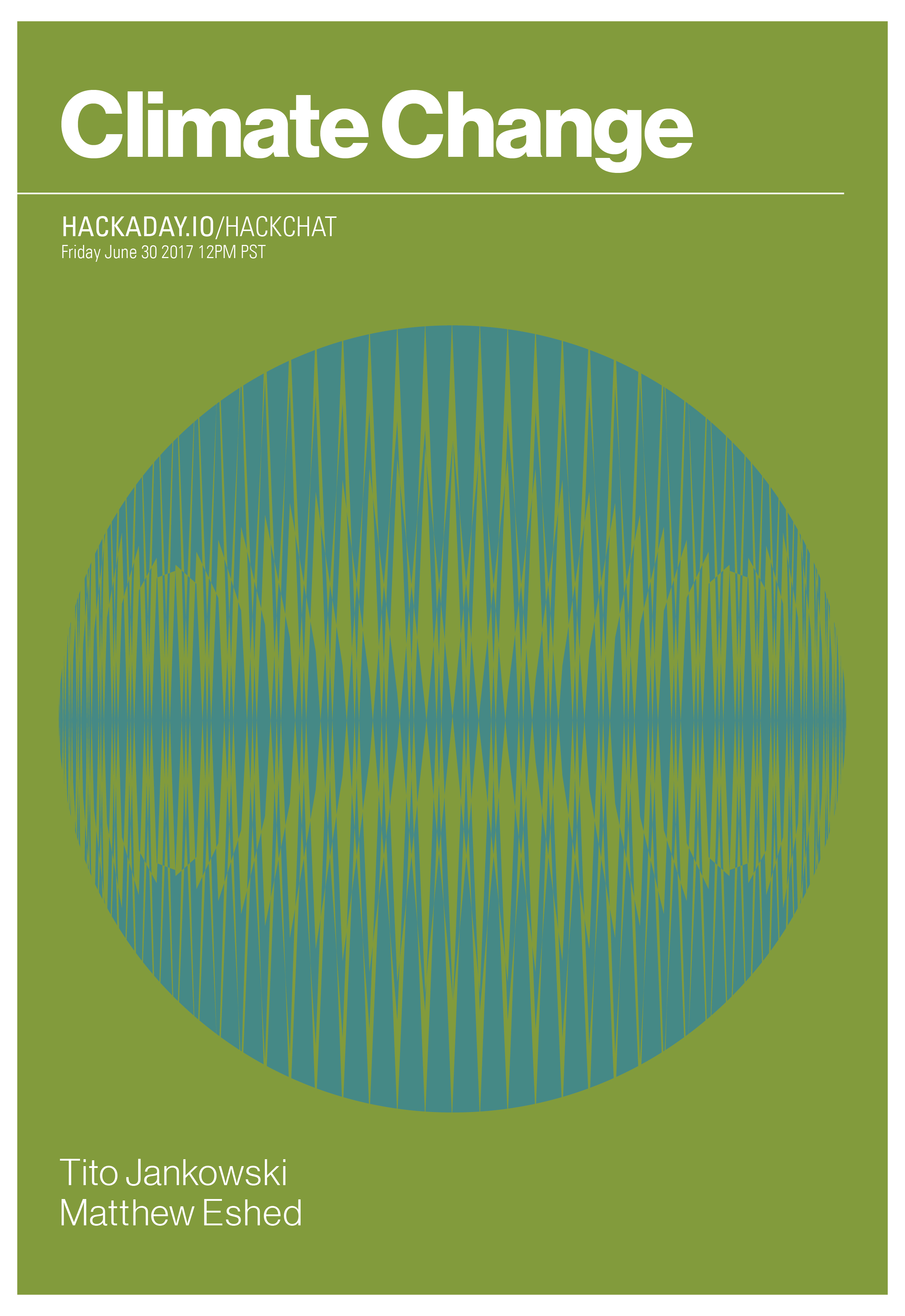Hack the Planet: Climate Change

By all accounts, Tito Jankowski has worn many hats. He’s been a biohacker, a hardware manufacturer, a medical device designer, a patent infringer, and a sailor. He co-founded BioCurious, Silicon Valley’s hackerspace for bio-tech, and built OpenPCR, an open source tool for replicating DNA. More recently, Tito co-founded Impossible Labs to find and fund folks that are trying to address the core problems of climate change.
It’s no secret that climate change is an important and complex topic, so it’s really easy to just throw your hands up and wait for the “experts” to come up with a strategy for solving the problem. Is that really in line with the hacker ethos, though? Can we do something about it ourselves? To answer these questions, Tito joined us in a Hack Chat to discuss his work with Impossible Labs and potential solutions to climate change.
Tito: So Impossible Labs wouldn't be the same if not for the Hackaday 2015 conference -- that was where the inspiration kicked off for me.
The winner of "Best product" was this water-saving agriculture project Vinduino. And a whole bunch of the honorary mentions were climate related things, there was a guy with a DIY radiation scope, and also a CNC machine for planting crops. I wasn't a climate change or environmental guy at all. but it kicked off this idea of 'what if as engineers and scientists we had something to add to climate change'?
So Impossible Labs extends from the key idea "what can technologists do about climate change"? We started looking around and there are a lot of innovators working in food, air, energy, and water -- people having the time of their life building crazy amazing stuff. They're not well connected together, and there's not funding for these types of projects -- so that's something we want to help with.
Project 2050 and an Open API for Climate Change
So what goal makes sense? A problem well-stated is a problem half-solved, so to put it very simply, we need to reduce the amount of carbon dioxide in the atmosphere.
Tito: A key factor of climate change as increased carbon dioxide in the atmosphere. The reason it matters is it causes the planet to retain more heat and other side effects.
Recently we've narrowed our focus onto removing carbon dioxide from the atmosphere, called Project 2050.
Project 2050 is a goal to return earth's atmosphere to 300 parts per million of carbon dioxide by 2050. Impossible Labs role is [to] find the entrepreneurs and startups working on solutions, and connect them to support, funding, and opportunities to scale.
So, 300 parts per million... what is that in context? Where are we now? How quickly is that number rising? Surprisingly, there haven’t been many tools to accurately communicate climate change data to the public. As Tito succinctly put it in a recent blog post, the #1 image result for “climate change chart” isn’t from a study, but from XKCD. In fact, only recently has an API been created to track this super important number.
Tito: Carbon dioxide in the atmosphere has been measured every hour since 1975. But the data isn't super accessible. So an international group of programmers and designers launched a new project a few weeks ago, an API to connect to NOAA's carbon dioxide data and make it more accessible.
It's the world's first open API for climate change. Today the API has carbon dioxide going back to 1975, and more coming soon. Here's the api docs to query it: http://api.carbondoomsday.com/#!/co2/list
As of June 26th we're at 408.76 parts per million of carbon dioxide. I like this image from wikipedia back to 400k years ago, shows how out of whack 400+ parts per million is. My understanding is even if we stopped all carbon dioxide emissions today, 408.76 parts per million will still cause lots of problems.
All the work is open source on Github: http://github.com/giving-a-fuck-about-climate-change it's an incredible team, lead developer Luke Murphy is in Ireland, several programmers from Germany, designer and marketer in Hawaii.
It's a great example I think of how hackers and programmers can get on board. This data was online for over a decade. But the people who were looking at it, no one thought to build an API or nice front-end. It took this open source group to build it.
So that's useful because now we know where we're at for Project 2050.
As one Hack Chat attendee pointed out, “it's not enough to just quit making a mess, we have to clean up our mess too.” Certainly making the problem more visible is important, but how do we actually address the problem? What approaches are groups taking now?
Some of the solutions are a lot simpler than you might think. Two options that Tito brought up were simply filtering the atmosphere to remove CO2 and using drones to plant trees. It’s likely that just one approach won’t solve this problem; there will have to be many solutions acting in concert.
The World's First Trillionaire
It’s also worth noting that there’s a huge opportunity for those who are able to come up with good solutions to climate change problems. Hackers have consistently probed and defined the bleeding edge of tech in a lot of industries, and there’s really no reason that climate change tech is any different.
Tito: I think engineers and technologists like us will kick off a revolution in climate change. We're currently not really involved in the climate stuff. Near the beginning of our journey, a hedge fund manager told us "Climate Change is the biggest financial opportunity civilization has ever seen". I like to paraphrase that as "Climate Change will create the first Trillionaire". Huge opening for entrepreneurs.
Others in the chat sought feedback on their ideas about influencing the complex climate system, and Tito always seemed to reply with “Maybe you could build such a lab to test this idea? I encourage you to build a prototype to make it easy for people.” It’s clear that Tito really embraces this idea that we are the ones who can tackle this problem. We should stop waiting for a top-down solution, and start testing as many different viable solutions as possible.
Tito finished with a list of general resources for the hacker who is interested in getting started working on this big problem. If you’re interested in saving the world (and making money doing it!) check out the links below, and get started now! If you do create a project, also be sure to enter it into the Hackaday Prize.
Don’t just worry about climate change... do something about it.
Tito: My favorite book to recommend is Sustainable Energy Without the Hot Air. Great book in print (endorsed by Cory Doctrow on BoingBoing), free pdf at https://www.withouthotair.com/download.html
Designer Bret Victor also wrote a great article here, "What Can A Technologist Do About Climate Change?" http://worrydream.com/ClimateChange/
Stay in touch from the signup on our website: http://impossiblelabs.io
If you're in San Francisco, join the Climate Change Plus Tech meetup group: https://www.meetup.com/climate-change-plus-tech
And check out Manylabs for more hackers, scientists, and inventors working on climate change and open science projects: https://www.meetup.com/manylabs-workspace
Impossible Labs is proud to be a resident at Manylabs in SoMa, San Francisco, everyone there is cool including our Executive Director Dvorit Mausner http://manylabs.org
Click here for the full transcript of the hack chat, which contains much more discussion on potential solutions to the problems touched on in this piece.
written by: Jordan Bunker
____________________________________________________________
Tito Jankowski and Matthew Eshed join us in the Hack Chat to discuss Climate Change.
Friday, June 30th at noon PDT, @Tito Jankowski will be hosting the Hack Chat.
You've heard about climate change. Bright minds see a chance to change the world!
Impossible Labs finds, tests, and scales tech to remove carbon. Their goal is to return Earth's atmosphere to 300 parts per million of carbon dioxide by 2050.
Tito Jankowski (co-founder, CEO) is an entrepreneur, a biohacker, a hardware manufacturer, a medical device designer, a patent infringer, and a sailor. Prior to launching Impossible Labs, he co-founded the BioCurious hackerspace and wrangled startup+corporate partnerships at Runway Incubator. He also co-authored the book "Maker Pro" with Bunnie Huang, Sophi Kravitz, Mitch Altman, and Eri Gentry. Tito holds a Sc.B in Biomedical Engineering from Brown University.
Matthew Eshed (co-founder, Operations) has designed, piloted, and launched manufacturing systems for high-tech (consumer 3d printers, internet of things), medium-tech (roof shingles), and low-tech (artisan cookies) products, and is a strong advocate for Cradle to Cradle principles of product development.
We'll be discussing:
- Project 2050: Removing atmospheric CO2 to return Earth to a pre-industrial atmosphere
- What can we do about climate change? What is the role of hackers in the climate change adventure?
- World's First Open API for Climate Change
Links::
titojankowski.com/no-one-gives-a-fck-about-climate-change/
https://github.com/giving-a-fuck-about-climate-change
Here's the sheet to guide the discussion.

 Lutetium
Lutetium